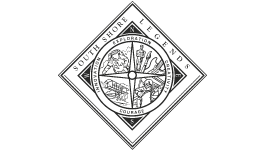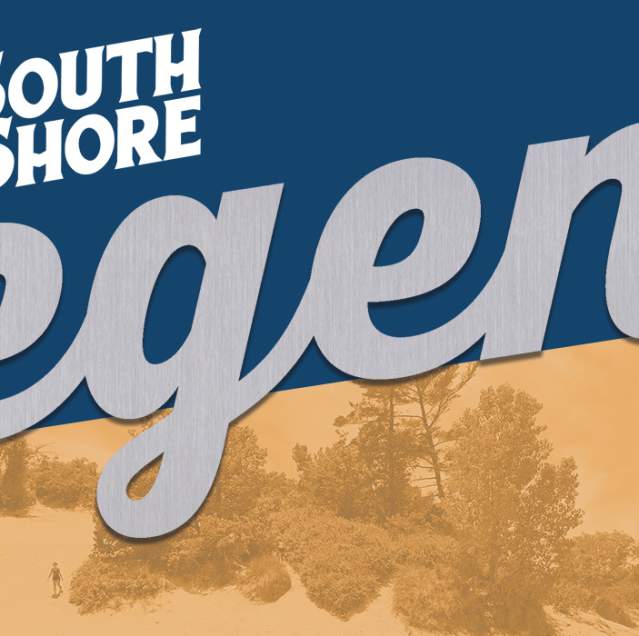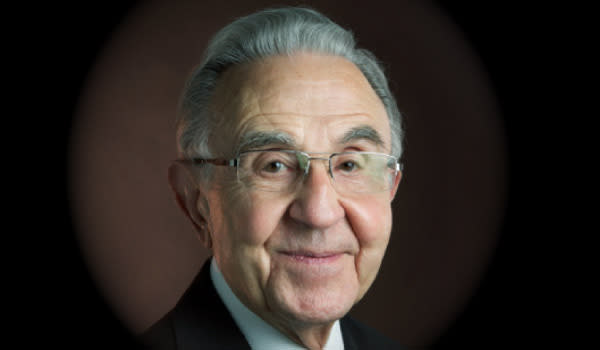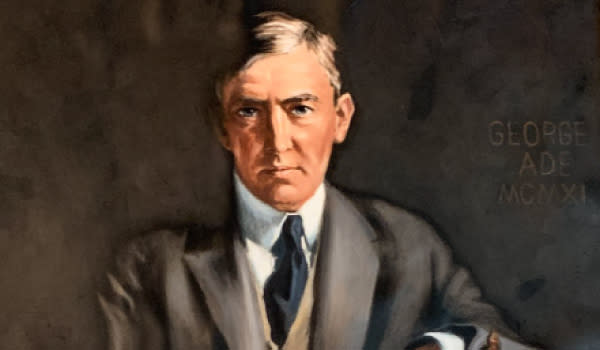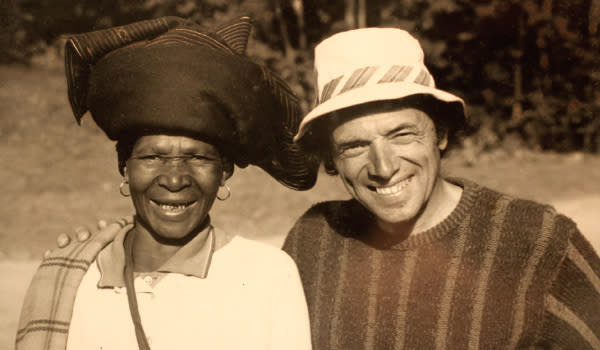Class of 2019
Thomas G. Katsahnias
Integrity, Valor, Character
Thomas G. Katsahnias, the son of a Greek immigrant, was in the forefront of a trilogy of industries during a turbulent time of change globally. He spent the majority of his career at Inland Steel, rising to become general manager and chief operating officer when the East Chicago mill was one of the nation's largest, employing more than 20,000 people. He served as CEO at other companies and brought innovation and leadership that also helped transform institutions in healthcare, education and the arts.
He served his country in the U.S. Army Chemical Corps as a bacteriologist. He flew the region as a pilot often overlooking the steel industry below. He sailed the shores of Lake Michigan as an accomplished sailor, and in his early years, he performed in Carmen at the Civic Opera House.
He earned his bachelor's degree in chemical engineering from IIT and was hired by Inland Steel in 1951. He served in the Army from 1954 to 1958 and later earned a master's degree in business administration from the University of Chicago. He worked in all parts of the mill and held 12 different positions at Inland before becoming the chief operating officer in 1978.
These were turbulent times for the industry as it struggled to recover from the 1975 recession. Yet 1978 was a record year for the company. Unfortunately, the 80s brought high levels of imports, oversupply and decreased demand. Inland persisted in developing new products and improved efficiencies under Mr. Katsahnias's leadership. During his tenure, Inland's No. 7 blast furnace, the largest state-of-the-art, world-class furnace, was dedicated at Indiana Harbor. This was an important step forward as the industry adapted to a new business environment.
After his retirement in 1986, Ancilla Systems sought his expertise and he became senior vice president and operating head of their hospitals. His ability to turn an entity around was proven once again at Calumet College of St. Joseph. The college was struggling to survive when he became Chairman of the Board of Trustees, serving from 1986 to 2011. His support led to several successful capital campaigns and the addition of NAIA athletics, which changed the culture of the college. Because of his tireless efforts, CCSJ continues to change the lives of students.
Throughout his life and career, Mr. Katsahnias exemplified the highest degree of integrity, valor and character often in the face of adversity. He serves as a shining role model for Northwest Indiana and beyond.
Thomas G. Katsahnias was nominated by Dr. Amy McCormack.
George Ade
American Writer, Playwright, Journalist, Philanthropist
George Ade (1866-1944) was a journalist, philanthropist, playwright and writer. He joined The Chicago Record after graduating from Purdue University in 1887. Ade's career rose rapidly as a result of outstanding coverage of a steamship explosion on the Chicago River and the Corbett-Sullivan boxing match, a premier sporting event of the era. Ade created a series entitled "Fables in Slang." More than 400 "Fables" were published between 1910 and 1930. In a "Golden Age" of Hoosier literary talent, including James Whitcomb Riley, Meredith Nicholson and Booth Tarkington, George Ade was recognized as the preeminent satirist of the time.
The Chicago Record engaged Ade to write global travel journals recounting tours of Europe, Asia and the Middle East. Ade authored musicals and plays using observations from his travels. He is the Father of the American Musical as we know it today. His first musical, "The Sultan of Sulu," changed Broadway. The work introduced a new format where a storyline was accompanied by music. For the next forty years, a play or musical written by George Ade was performed in the continental United States. He still holds the enviable record of having three different works performed on Broadway simultaneously.
For his fundraising efforts on behalf of the Red Cross during World War I, the Liberty ship, S.S. Ade, was named in his honor. Ade's generosity included his Alma Mater. He collaborated with David Ross to build Ross-Ade Football Stadium along with contributions to the Purdue Memorial Gym and Memorial Union. He served as Grand Consul for the Sigma Chi Fraternity, where he authored the Creed still used today.
In 1908, the Republican National Committee chose Ade's home as the site for what was to become William Howard Taft's successful bid for President of the United States. More than 20,000 people gathered for the event. Taft was one of four U.S. Presidents to visit George Ade at his home, along with Warren Harding, Calvin Coolidge and Theodore Roosevelt.
George Ade's writing was, and is, an inspiration to writers. His "Fables", essays and lyrics epitomize the linguistic charms of the era. His works span the ages with profiles of human failings and idiosyncrasies written in a gentle fashion. He was one of us, not just an observer. As he wrote of Mr. Wallace in "Effie Whittlesly", "He had been reared in the democracy of a small community and the democratic spirit came uppermost."
George Ade was nominated by Mike Davis with Dave Ryan.
Dr. Harold E. Scheub
Emeritus Professor of African Languages and Literature
Harold E. Scheub (1931-2019) was born and raised in Gary with brothers Fred, Ken and Gerry. The son of Fred, a postal carrier, and Evelyn, a housewife, he became one of the world's leading scholars in African oral tradition and folklore. Retiring from the University of Wisconsin-Madison after 43 years, his epic journey amassed more than 10,000 stories over four years as he walked more than 6,000 miles in African countries. He taught and researched there in the 1960s, learning the Xhosa, Zulu, Sotho, Ndebele, Swahili and other oral traditions. Meanwhile, he published 30 books and 50 scholarly papers based on his recorded stories.
Before retiring in 2013 at age 83, Professor Scheub pushed new boundaries to inspire his students to go beyond the stereotypes to learn about our common humanity. That is, to overcome barriers of culture, language and differences in the belief that shared knowledge and experience conquer ignorance.
After graduating from Tolleston High School, he served as a jet mechanic instructor during the Korean War. He then received his B.A. and his M.A. in English Literature from the University of Michigan. He earned his Ph.D. in African Languages and Literature from the University of Wisconsin in 1969. He also was a Fulbright Lecturer at National University in Lesotho in 1997. His career included Valparaiso University and Masindi Senior Secondary School in Uganda.
While in Africa, Dr. Scheub was fearless in his pursuit of knowledge walking from village to village. His research took place on foot as he carried a recorder to gather stories during the height of apartheid. Despite local suspicions, he was invited into rural homes. He often sat with the storytellers and their families in their dwellings, listening to different dialects at a time when he was just beginning to grasp the language. He had no expectation for them to speak English. Instead, he learned 17 dialects in African languages so he could effectively understand and communicate. He taped poetry, tales, myths and epic stories, bringing thousands of recordings back to the university and many are now part of the school's digital collection.
He introduced students to the oral traditions of Africa, embarking on a teaching and writing career that illuminates an art as ancient as human existence. His class sizes spanned in size up to 500 students. He established a scholarship to support their financial needs in 2011. Dr. Scheub received significant awards, but he prized above all sharing his deep and profound love for all humanity.
Dr. Harold E. Scheub was nominated by his brother, Gerry J. Scheub.
Sponsored by

